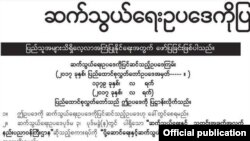A leading human rights group is criticizing Myanmar’s legislators for backing a new amendment to the telecommunications law, saying the amendment which allows bail for those charged with using online media for defamation does little to bring the law up to international freedom-of-speech standards.
On Wednesday, the Upper House passed an amendment to Section 66(D) of the Telecommunication Law of 2013 in a confidential vote. The Lower House is expected to vote on the amendment next week.
Phil Robertson, the Asian affairs assistant director of Human Rights Watch told VOA Burmese [[ https://burmese.voanews.com ]] that the amendment to allow bail for those accused of defamation is like putting a Band-Aid on a wound gushing blood. “It’s not going to solve the problem,” he said.
The law is a holdover from the era when Myanmar’s military-dominated civilian government sought to restrict speech for political reasons. Section 66(D) of the Telecommunications Law says anyone “extorting, coercing, restraining wrongfully, defaming, disturbing, causing undue influence or threatening to any person by using any telecommunications network” faces prosecution and a possible prison sentence of up to three years, plus a fine.”
Because Section 66(D) lacks specificity, it is unclear what speech falls within the scope of the law, according a letter Human Rights Watch wrote to government officials in May. [[ https://www.hrw.org/news/2017/05/10/burma-letter-section-66d-telecommunications-law ]] Rights activists say the use of the social media law has spiked since the new National League for Democracy (NLD) government took office in January 2016.
“In the last two years, this law has opened the door to a wave of criminal prosecutions of individuals for peaceful communications on Facebook and has increasingly been used to stifle criticism of the authorities,” said a letter [[ https://www.amnesty.org/en/documents/asa16/6617/2017/en/ ]] urging legislators to repeal Section 66(D) with 45 signatories including Amnesty International.
At least 81 people have been charged with violating the law and at least eight people have been sentenced to prison terms, almost all for postings on Facebook or other social media since voters replaced the government dominated by former generals with the NLD, the party of Aung San Suu Kyi. Many of the cases have involved charges filed by the military officers against bloggers and journalists.
Because those charged under the law are not entitled to bail, many people have been detained for months pending trial.
Upper House lawmaker U Aung Thein told VOA that 66(D) is needed to protect citizens who can be vulnerable to defamation spread via social media.
“Most cases of defamation are charged under Article 500 of the penal code, and they can be discreetly handled by the concerned parties in court. But with cases of defamation involving social media which are charged under Section 66 (D), they can spread worldwide within seconds.”
Human Rights Watch and other rights groups have repeatedly called upon the government in Napyidaw to reform holdover limits on expression imposed by the military government and made recommendations on how to bring the Telecommunications Law in line with international standards, [[https://www.article19.org/data/files/medialibrary/38665/Myanmar-analysis--8-March-2017.pdf. ]] “but it seems that government of Burma is not just listening,” Robertson said.
“We want to see this law reform in line with international human rights standards,” Robertson said. “It’s pretty simple. There are certain standards that set out what restrictions can be legally imposed on expression and this law does not conform to those.It's not even close.”
He pointed out that while many NLD lawmakers had been jailed under the previous regime’s use of Section 66(D) they now seem disinterested in wiping the old laws off the books.
Khin Maung Myint, one of the lawyers who defends journalists detained under the law, is worried that the amendment in the pipeline is likely to cause more, not fewer, restrictions on speech.
“This amendment does not change the main problem, which is that it remains solely in the power of the police to decide which cases are criminal,” Khin Maung Myint told VOA Burmese. “The amendment gives police more power to arrest suspects and file charges.”
Police departments in Myanmar are overseen by the Ministry of Home Affairs, which is directly controlled by the Ministry of Defense.
“There’s nothing in the amendment that limits the police,” he said. “This is really very dangerous for public if the police do not handle cases carefully.”
Robertson says passage of the amendment will result in more cases being brought under Section 66 (D) because the government and the military will use “this law to attack civil society, to attack ordinary Burmese, to attack the media. This is really disappointing. It raises once again fundamental concerns about whether the Burmese government is serious about respecting human rights or not. This was supposed to be a new government. This was supposed to be a government elected by the people that respected people’s right. We are not seeing that.”
Khin Soe Win contributed to this report which originated on VOA Burmese [[https://burmese.voanews.com/ ]].




